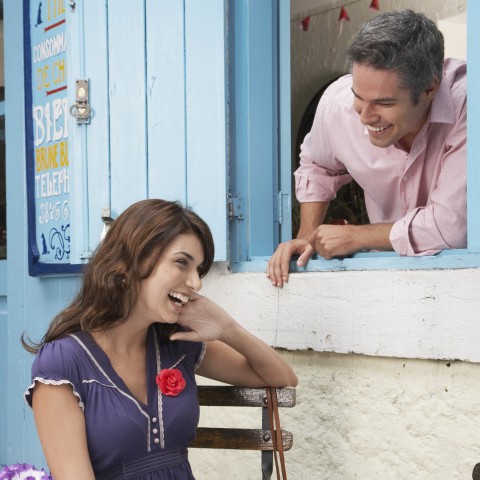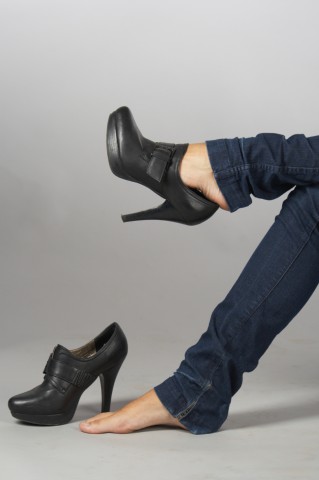When you compliment someone, you’re doing so much more than offering them kind words. You’re also boosting their confidence, showing them that you’re on their side, and extending a hand of friendship (or strengthening the one you have). A meaningful, well-placed compliment can even change a person’s entire day for the better!
Just about everyone loves compliments, and learning how to offer compliments in someone’s native language will make both of you feel great!
Lucky for you, EnglishClass101.com has prepared a simple guide on the best compliment phrases in English for a variety of situations and people. Once you have these down, you can build off of them and create your own unique compliments for the people in your life!
Let’s learn English compliments together!
- English Compliments List
- How Do You Make Compliments Sound Sincere?
- What to Expect Afterwards
- Final Thoughts
1. English Compliments List
1- Look & Personality
Many compliments in English are aimed at a person’s appearance or their personality.
Here are some basic sentence structures you can use when giving compliments in English about someone’s looks or personality. These are phrases that you can say to anyone simply by filling in the blanks with the appropriate words for the situation.
| Compliment | Notes | Example Situation |
|---|---|---|
| “I love your ___!” | Here, you can fill in the blank with something about the person that you love.
This can be an article of clothing, a personality trait, or even a haircut. |
You run into someone you know at the grocery store and notice they recently got their hair cut or styled.
You greet them and say “I love your haircut!” |
| “Your ___ is/are so ___.” | Here, you can fill in the first blank with the thing or trait you’re commenting on.
In the second blank, you put an adjective to describe that thing or trait. |
A female friend picks you up to spend the day together. You notice that she recently had her nails done.
You comment by saying “Your nails are so pretty.” |
| “That/Those ___ is/are really ___.” | This is the same as the compliment directly above. You meet with a friend who’s wearing a pair of cool-/cute-looking shoes you haven’t seen them wear before. |
You compliment their shoes by saying “Those shoes are really cute/cool.” |
| “I like ___” | Here, you put the object or trait that you like in the blank. | A colleague you know well comes into the office wearing a new shirt.
You compliment their shirt by saying “I like the shirt you’re wearing.” |
| “Is that a new ___? I like it.” | Here, you put what you’re commenting on in the blank. This phrase is normally used for clothing, other objects, or changes in appearance.
When you use this compliment, it shows that you really pay attention to that person and what they own/wear. |
You’re spending time with a close friend and suddenly notice they’re wearing a new jacket.
You say “Is that a new jacket? I like it.” |
| “You’re so ___.” | Use this phrase to compliment someone on a personality trait you admire in them. | Someone gives you a compliment, so you smile and say “You’re so sweet!” |
A- English Compliments to a Woman
If you’re trying to win a woman’s heart, here are some compliments you can say to her. Generally, these are best used on a date or other romantic occasion.
| Compliment | Notes | Example Situation |
|---|---|---|
| “You have a beautiful smile.” | You say something that makes your date laugh, and you tell her “You have a beautiful smile.” | |
| “You look lovely.” | You’re picking up your date, who’s dressed up, and you tell her “You look lovely.” | |
| “Has anyone told you how beautiful you are?” | Many women love to be complimented in the form of a question, especially in a romantic context like a date. | You’re on a date with a woman you think is very beautiful, and you say this to her. |
| “You have a kind heart.” | You see a woman you like do something nice for someone, so you say this to her the next chance you get. | |
| “You’re beautiful inside and out.” | By telling a woman she’s beautiful inside and out, you’re saying that both her appearance and personality are beautiful to you. | When you’ve been in a relationship with a woman for a little while, you can say this to her to brighten her day. |
B- English Compliments to a Man
Is there a man who’s caught your eye or your heart? Here are a few compliments you can give him. These are best used on a date or other romantic occasion.
| Compliment | Notes | Example Situation |
|---|---|---|
| “You’re very handsome.” | You happen to see a man you like dressed up nicely, so you say this to him. | |
| “How charming you are!” | You’re on a date with a man, and he says something cute or funny, so you tell him this. | |
| “You’re very strong.” | This can mean either physically, mentally, or emotionally. | A man you like is helping you carry something heavy. To compliment him, you can say “You’re very strong.” |
| “There aren’t many men like you.” | This phrase implies that you think this man is one-of-a-kind and better than most other men. | When you’ve been in a relationship with a man for a while, you can tell him this to brighten his day and show your appreciation. |
| “You’re a good man.” | You can tell this to a man who you think is a good person. |
Do you need to brush up on your English vocabulary? You may want to check out the following vocabulary lists on EnglishClass101:
- Clothes
- Clothing Accessories
- Personality
- 50 Most Common Adjectives
- Common Phrases You’ll Need for a Date
2- Work
Giving someone a compliment on a job well done or overall good work performance can really make their day and encourage future success. Depending on how well you know the coworker (or employee), you may want to give a more general compliment or one that’s more specific and detailed.
Here are a few typical English compliments for the workplace!
A- General
| Compliment | Example Situation | Notes |
|---|---|---|
| “Good job.” “Well done.” “Nice work.” “Nicely done.” “You did great.” |
A colleague you know well receives a high performance rating on a big project.
After they tell you about it, you say one of these phrases to congratulate them. |
All of these phrases are interchangeable. They are simple ways of congratulating someone on a job well done.
In informal situations, such as spending time with close friends, all of these phrases can also be used sarcastically. This is usually done when you or another member of the group does something clumsily or not very well. However, in formal situations, these are used as genuine compliments. |
B- Specific
| Compliment | Example Situation | Notes |
|---|---|---|
| “You gave a really good presentation.” | One of your colleagues had given an important presentation earlier, and you thought they did really well.
After work, you make sure to tell them “You gave a really good presentation.” |
|
| “That’s a great idea.” | You’re stuck on a task that seems impossible, and your partner for the project suggests something that may help.
Relieved, you tell them “That’s a great idea. (Thank you.)” |
|
| “You did really well (on) ___.” | A colleague just got finished redesigning your company’s website.
Impressed, you tell them “You did really well redesigning the website.” |
Here, you can fill in the blank with whatever thing that person did well on. |
| “I appreciate your work on this.” | One of your employees did a really good job on a difficult task you assigned them.
To let them know you’re impressed and that you took notice of their work, you say “I appreciate your work on this.” |
|
| “The way you ___ was amazing.” | A colleague did a great job working with a difficult client earlier that day.
To show them you’re impressed, you say “The way you handled that client was amazing.” |
Here, you can fill in the blank with whatever task/assignment/action this person did that you thought was amazing. |
Do you need more words for the office or talking about your job? Check out the following vocabulary lists on EnglishClass101:
3- Skills

Some of the best English compliments you can give someone are those about their skills. If you notice that someone does really well at something, go ahead and let them know!
| Compliments | Example Situation | Notes |
|---|---|---|
| “Great job out there!” | Your friend invited you to a tennis tournament they’re competing in.
After the event, you meet up with your friend and tell them “Great job out there!” to show you were impressed with their skills. |
|
| “Are you sure you’re not a professional?” | Your friend does photography as a hobby and offered to take your wedding photos.
After you see how good the photos are, you say “Are you sure you’re not a professional?” |
This is a fun, informal way of letting someone know how highly you think of their skill or ability in something. |
| “Wow, I’m impressed!” | You attend a play that your friend is acting in, and they did a remarkable job.
After the play, you tell them “Wow, I’m impressed!” |
| Compliments | Notes | Example Situation |
|---|---|---|
| “You’re good at ___.” | Here, fill in the blank with the skill or activity you’re commenting on.
You can also add the modifiers “really” or “very” to show that they’re better than good. 😉 |
You’re at a friend’s house and they play their guitar for you.
They did well, so you say “You’re (really) good at playing the guitar.” |
| “You’re a great ___.” | Here, fill in the blank with the name of the hobby, profession, or other activity you’re commenting on. | You see a friend’s painting that they’ve been working on for weeks.
It looks very cool, so you tell them “You’re a great painter.” |
| “You ___ beautifully.” | Here, fill in the blank with the skill or activity the person does beautifully.
Use this phrase if you really want to see that person smile. This compliment tends to mean a lot to someone. |
You hear someone you know singing and think they sing very well.
When you get the chance, you tell them “You sing beautifully.” |
| “You’re such a good ___.” | Here, fill in the blank with the name of that person’s profession, hobby, or role. | In debate class, you find yourself impressed with a classmate’s speaking abilities.
After class, you tell them “You’re such a good speaker/orator.” |
| “You’re a ___ [adjective] ___ [skill/hobby/profession].” | This one is a little more complicated.
In the first blank, fill in a positive adjective that describes their skill, hobby, or profession. In the second blank, put the name of their skill, hobby, or profession. |
1. “You’re a talented writer.”
2. “You’re a wonderful soccer player.” 3. “You’re a skilled origamist.” |
| Compliments | Example Situation | Notes | |
|---|---|---|---|
| Cooking | “This is a really good meal.”
“Wow, can I have the recipe?” “Thank you for this wonderful meal.” |
You’ve just finished eating dinner at a friend’s house.
To compliment their cooking, you say one of these phrases. |
|
| Photography | “Those are beautiful pictures.”
“You’re so good at photography.” “You’re great with a camera.” |
A friend shows you some photographs they’ve taken recently.
You’re impressed, so you say one of these phrases to them. |
|
| Drawing | “Your drawing is really cool/pretty.”
“I really like your drawing.” “I wish I could draw as well as you.” |
You happen to look over to your classmate’s desk and notice them drawing.
You think it’s a great drawing, so you tell them one of these phrases. |
|
| Writing | “Your writing is very good.”
“I like reading what you write.” “You should write a book!” |
A friend was kind enough to show you something they wrote.
You think it’s really good, so you tell them one of these phrases. |
|
| Singing | “I’m so jealous of your singing voice!”
“Your singing voice is very pretty.” “Where did you learn to sing like that?” |
You and some friends have a karaoke night, and you’re surprised when one of them is a very good singer.
To compliment them, you say one of these phrases. |
|
| Sports | “You did really well in your ___ game.”
“It was fun watching you play.” “You could be in the ___!” |
You watched a sports game that someone you know played in.
You thought they did well, so you tell them one of these phrases. |
In the first phrase, you can replace the blank with whatever game they were playing. (Ex. “soccer game.” )
In the final phrase, you can replace the blank with a sports team or organization related to the sport they were playing. It means that they’re good enough to play professionally. (Ex. “in the NFL!” ) |
| Games | “You’re a wonderful ___ player.”
“You always beat me at ___.” “One of these days I’ll win.” |
You’ve just finished playing a game with a new acquaintance and they won.
You’re impressed, so you tell them one of these phrases. |
In the first phrase, you can replace the blank with whatever game you were playing. (Ex. “Backgammon player.” )
In the second phrase, you can replace the blank with whatever game you were playing. (Ex. “at Monopoly.” ) |
There are so many things you can compliment someone on regarding their skills! If you need to brush up on your vocabulary for these topics, EnglishClass101 has the following vocabulary lists:
4- Bonus: Very American Compliments
Now, here are some English slang compliments that Americans love to use, especially on social media. Don’t be surprised if you hear some of these in person, too!
| Compliment | Notes | Example Situation |
|---|---|---|
| “You’re the real MVP.” | This is a popular phrase in the United States, rising to fame as a meme featuring Kevin Durant.
It means that you’re the “most valuable player,” which is a title awarded to sports players. It can be used as a genuine compliment but is almost always said ironically and humorously. |
You pick up a piece of litter off the ground and throw it away.
Someone you know sees and says “You’re the real MVP.” |
| “You’re on fire.” / “You’re on a roll.” | This means that someone is continuously doing very well at something. | You’re about to beat your high score in a video game. Your best friend says, “You’re on a roll!” to encourage and compliment you. |
| “Why/how are you so ___ ?” | Fill in the blank with either a positive adjective or a clause to finish the thought. | A coworker walks by your desk and notices that it’s very clean. They say “How are you so organized?” as a compliment. |
| “You’re on your A-game.” | This means that someone is doing something to the very best of their ability. | You’ve passed three exams in a row. Your friend in class notices, and says “You’re on your A-game!” |
| “You’re a doll.” | This means that someone is being very kind, sweet, or cute. It’s typically said between two female friends. | Your female friend invites you to her house for lunch. You bake cookies before coming over and bring them with you.
When your friend sees the cookies, she tells you “Thank you. You’re a doll!” |
2. How Do You Make Compliments Sound Sincere?
When you give a compliment in English, the last thing you want to do is sound insincere or fake. Americans tend to be very sensitive to this and might form a negative opinion of you if they think you’re not being sincere with your compliments.
When you pay someone a compliment in English, there are a few things you can do and be mindful of to sound more sincere.
- Avoid complimenting too much or too often.
If you’re always giving people compliments, those people will become less likely to believe that you’re sincere. Be sure to only compliment when you mean it, and even then, don’t compliment every time you feel like it. In general, you should save your compliments for times and situations that matter.
- Don’t overdo your compliment.
When giving compliments in English, don’t overdo it. Just as you shouldn’t compliment too often, you also shouldn’t put too much in your compliment.
Avoid using words like “fantastic,” “spectacular,” and “wonderful,” unless you really, really mean it. Don’t make your compliment overly wordy, and don’t keep going on and on about it.
- Make sure your compliment is relevant.
If you comment on something that has nothing to do with the current situation, people may not take the compliment seriously (or will be confused by it).
For example, if you’re playing a video game with a friend, it’s probably not the right time to compliment them on their new haircut or guitar skills.
Sometimes, if you’ve just met someone for the first time, it may be appropriate to offer an off-handed compliment about their appearance or something good you’ve heard about them.
- Comment on details.
You can skip this tip if your English isn’t very good yet. Basic compliments will still make someone’s day. But if you feel confident enough, people love to hear the little details about why you’ve complimented them.
Being able to comment on details shows that you’re really paying attention to them and mean what you’re saying.
For example, instead of just saying “I love your haircut,” you can say “I love your haircut. It really frames your face well.” Instead of saying “You’re good at playing the guitar,” you can say “You’re good at playing the guitar. It sounds very smooth and natural.”
- Look them in the eyes.
Generally, in the United States, people prefer eye contact when speaking with each other. This is especially true when talking about a serious topic or letting someone know you’re being honest with them.
Appropriate eye contact for Americans is something that will become more natural to you as you continue speaking with people.
For more information on body language in the United States, you can check out my article on Body Language!
3. What to Expect Afterwards
In the United States, people have different reactions to compliments depending on a variety of factors.
1. Situation/Setting: Work or social? Friend or stranger? In public or in private?
2. Who’s giving the compliment: How well do they know you, and in what context?
3. What the compliment is about: Was your compliment sincere? Is it something they’re comfortable being complimented on?
In general, Americans will gladly receive compliments with a “thank you.” A lot of the time, they’ll also give you a compliment in return. This can be about either the same thing or something else:
A: “I like your shirt.”
B: “Thank you! I like yours too.” OR “Thank you! I really like your shoes by the way.”
Some people may try to deflect the compliment if they feel uncomfortable, embarrassed, or not worthy of the compliment:
A: “That was a great presentation!”
B: “Thanks, I thought I could have done better though.” OR “You thought so? I could have done better.”
In the event that this happens, don’t worry too much. They probably do appreciate the compliment, but it’s best not to push it on them.
4. Final Thoughts
As long as you’re sincere in your compliments and don’t hand them out too freely, especially around people you see all the time, Americans tend to love being complimented—and giving compliments in return.
Do you feel more comfortable giving the most common compliments in English now? What are some common compliments in your own language? We look forward to hearing from you!
Once you’re more confident in your English-speaking abilities, don’t be afraid to experiment a little. You can use the same sentence patterns and basic phrases we went over in this article to create your own compliments in English. While any compliment can make someone smile, a more unique one will warm their hearts.
And remember that EnglishClass101.com will be here to help and guide you as you continue delving into the English language! Create your free lifetime account today, and learn English like never before!
Happy English learning!



















